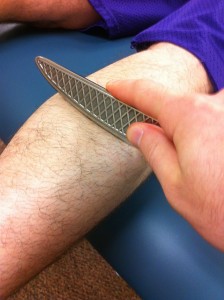Now Accepting New Patients! 919.678.8828
Hours: Monday through Friday 9am – 6pm | Map & Directions

Now Accepting New Patients! 919.678.8828
 Appointments
Appointments No matter what the workout of the day is, or wherever they train, Crossfit athletes share one common feature. They like to push their bodies as hard as they can every day. Like other athletes who participate in intense physical training or other physical activities, it’s not uncommon to wake up stiff or sore the morning after a hard workout. Soreness probably won’t stop a Crossfit athlete from training, but it may cause them to move less efficiently which can limit their ability to have a quality training session. While this soreness may not directly cause an injury, poor lifting mechanics due to impaired movement quality can lead to an overuse injury. So aside from a proper training program and appropriate “rest days” that are built into the program, what can a Crossfit athlete do to help prevent small issues become larger problems?
One option available to Crossfit athletes is soft tissue mobilization. Soft tissue mobilization can improve tissue quality by improving blood flow, it can increase mobility and range of motion, and eliminate trigger points within the muscle which limit range of motion, decrease power and often times are a cause of muscle pain. One of the most successful techniques physical therapists use to mobilize soft tissue is by using an instrument assisted soft tissue mobilization technique (IASTM).
No matter what the workout of the day is, or wherever they train, Crossfit athletes share one common feature. They like to push their bodies as hard as they can every day. Like other athletes who participate in intense physical training or other physical activities, it’s not uncommon to wake up stiff or sore the morning after a hard workout. Soreness probably won’t stop a Crossfit athlete from training, but it may cause them to move less efficiently which can limit their ability to have a quality training session. While this soreness may not directly cause an injury, poor lifting mechanics due to impaired movement quality can lead to an overuse injury. So aside from a proper training program and appropriate “rest days” that are built into the program, what can a Crossfit athlete do to help prevent small issues become larger problems?
One option available to Crossfit athletes is soft tissue mobilization. Soft tissue mobilization can improve tissue quality by improving blood flow, it can increase mobility and range of motion, and eliminate trigger points within the muscle which limit range of motion, decrease power and often times are a cause of muscle pain. One of the most successful techniques physical therapists use to mobilize soft tissue is by using an instrument assisted soft tissue mobilization technique (IASTM).